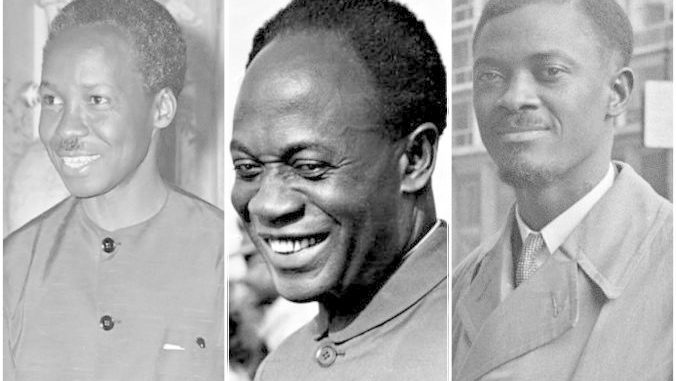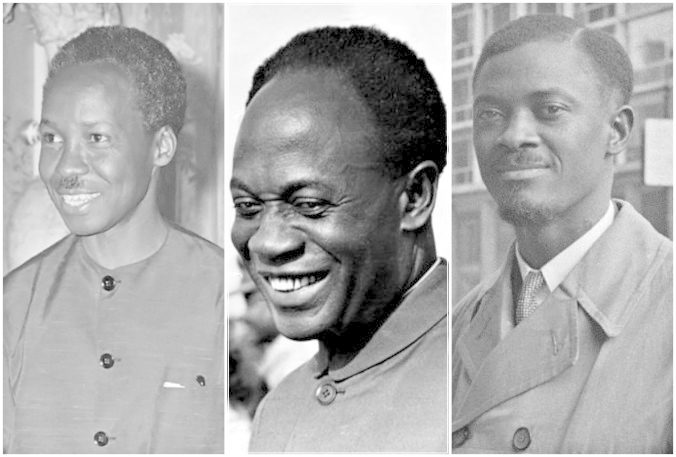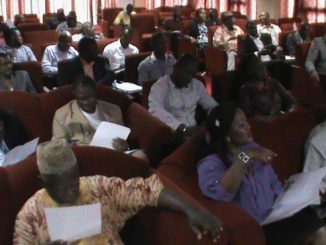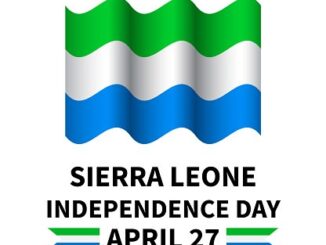
- “Pan-Africanism has been up the podium from the outset of the 20th century, chanting down imperialism, propagating cohesion and charting the course to a better Africa. Tragically, the vision remains a file too large to retrieve… “
-
I feel we need to deconstruct the “sexy” side of African politics. Always putting a romanticized costume when discussing African politics prevents us from confronting real issues facing our continent.

-
This is not a manifestation of Afro-pessimism or “self hate” on my part but an honest, brutal assessment of what I see before me.
There is something very disturbing with the so-called “independence” in Africa, which started in the 1950s when colonial powers left the continent and replaced by their extended, darker skinned relatives.
A white man left Africa, peacefully in some places and he had to hear the sound of a barrel of the gun in some parts of the continent for him to eventually pack his bags.
In settler colonies where many Europeans resided like Algeria, Angola, Rhodesia, Moçambique, Kenya, and South Africa/ Namibia violent and debilitating wars occurred between “locals” and occupiers.
The leaders of liberation in Africa were largely by-products of the colonial system that they claimed to be against. From Albert Luthuli to Jomo Kenyatta. From Robert Mugabe to Leopold Senghor.
Kwame Nkrumah, Kamuzu Banda, Seretse Khama, Nelson Mandela and others, they were all offsprings of the repressive colonial system that they helped displace, at least in words only.
As a first effort the philosophy of Pan-Africanism recognised that the liberation of black people all over the world was paramount.
Many centuries before colonialism started to end, Haiti was the first black nation to be freed from colonialism in 1791. Freedom for African slaves and peoples of the continent and elsewhere came much later.
Slavery ended a few decades after the Haitian revolution.
The likes of Ghana and Sudan became independent in the 1950s and most others followed in the 1960s. Zimbabwe and Namibia finally gained independence in 1980 and 1990 respectively, and South Africa adopted majority democratic rule in 1994.
Blacks in America got their political emancipation in the early 1960s like African nations.
This basic history pertaining to Africans around the world is important to set the context for this discussion.
My argument is that Africans globally failed horribly to coalesce and unite to help each other to grow. I put blame on the attitudes of freedom fighters who instead of looking at other Africans for solutions, they decided to look up to their former colonisers for ideas.
Africans born elsewhere like Frantz Fanon (Martinique) and Walter Rodney (Guyana) made Africa their home after “independence” but it does not look like the new African leadership understood what this gesture meant, politically speaking at least.
What was interesting is that most, if not all, of the inaugural leadership of the post-colonial state in Africa was educated/ exiled in Europe.
The foundations of many ‘liberation movements’ across the continent can be traced to educated blacks colonies who had pledged their allegiance to the British Crown, and who were sometimes aggrieved that whites did not give them the recognition they they felt they deserved.
Nonetheless, the initial step that the new leaders took was entrenching the European statehood and promotion of European languages, culture and practices.
The Organisation of African Unity (OAU) Charter supported “territorial integrity and inviolability of the borders within which independence was attained“. They also made European languages as working languages of the OAU, and this did not end when the organisation became the African Union (AU) in 2002.
By retaining colonial structures intact, the new leadership argued that they did not want to alter borders as this would have opened a pandora’s box, and that they also wanted to protect the integrity of post-colonial states.
At superficial level, this looked like a very noble act but in reality this helped to preserve the image of the white man that all of these leaders adored in one way or the other.
But they literally entrenched a Wesphalian state system, with its all weaknesses and impracticalities. Also, the OAU preserved the dominance of European languages such as French, Portuguese and English, the exceptions in this regard were Arabic and KiSwahili.
Where is uhuru?
The independent state in Africa is synonymous with repression, extreme abuse of power and chaos.
“By showing themselves disunited, inefficient and corrupt, depravities Nkrumah warned against at the dawn of Africa’s independence, African leaders have gravely harmed millions of citizens who invested trust in them,” reasons Mushava.
Tracing from its colonial problem of creating endless problems, the post-colonial state did not bring freedom to African people but it solidified the position of elite class (“comprador“) [Fanon wrote extensively on this subject, for example see the book titled: “The Wretched Earth“].
This elite comprised both the political and private sections of the community, particularly the educated. The elite class directly traced its roots from the colonial state, these included doctors, teachers, public servants, etc.
As Chinua Achebe points out in ‘The Trouble with Nigeria’ : “One of the commonest manifestations of underdevelopment is a tendency among the ruling elite to live in a world of make-believe and unrealistic expectations.”
These people saw themselves as natural successors of their former colonial masters, with total disregard for an inclusive state.
Some of the men who stand out for me in this state of confusion and autocracy include Léopold Senghor of Senegal, Ingwazi Kamuzu Banda of Malawi, and Jose dos Santos of Angola as well as Félix Houphouët-Boigny of Cote d’Ivoire .
Banda was Malawi’s long time ruler since the 1960s until his death. A “black saint or white stooge?” – This how Banda was described by his biographer. All he stood for was whiteness and circus.
He remained the only southern African leader to maintain full diplomatic relations with apartheid South Africa, and Kenya maintained low key relations with Pretoria throughout.
Angola’s dos Santos was an epitome of colonial legacy especially on matters of race. It is quite surprising how Angolan elites take pride in their associations with Portugal. Angola is much more like a Portuguese autonomous region like Madeira and Azores.
Every other second person amongst the elites in the Angolan capital Luanda carries a Portuguese passport. The rest of the population lives in abject poverty and without hope.
Senghor’s long life embraced many dichotomies – between Africa and Europe, black and white, colonialism and independence, elitism and populism, even culture and politics – all marked by a constant quest to reconcile opposites.
He was the first of the independence generation of African leaders, many of whom ruled autocratically over one-party states. He worked closely with the likes of Felix Houphouet-Boigny of Ivory Coast to maintain the French identity in West Africa, through the the French West African Federation (AOF).
The French fault lines exist to this day.
Houphouet-Boigny held offices in local, provincial, national, regional and metropolitan French government. He built the biggest Catholic church building in his hometown of Yamoussoukro, the “Basilica of Our Lady of Peace of Yamoussoukro“, at a cost of US$300 million.
He was also suspected in the toppling of Thomas Sankara in Burkina Faso, and also supported UNITA in Angola.
Successive governments in the post-colonial state of Kenya have dismally failed to deconstruct the old structure of land tenure.
It is claimed, “People with political connections control more than 50 percent of the Kenya’s wealth that is owned by individuals.” The list of the wealthy political dynasties and billionaire landowners reflects Kenya’s top political leadership.
The family of the founding father of the nation is one of the richest in Kenya, for example. President Uhuru Kenyatta is a scion of the family.
Also, retired president Daniel arap Moi, who ruled Kenya for 24 years, ranks among the richest Kenyans with an estimated wealth in hundreds of billions of shillings.
The family has interests in various sectors, including banking where they hold shares in more than two banks, the oil industry, insurance, hotel and tourism, maritime and freight, media, manufacturing, airline and transport. The Moi family is also big in land ownership, real estate and education.
In addition, the Odinga and Kibaki families also rank among the wealthiest and own large swathes of land.
With these examples above, the supposed drivers of the Pan Africanism ideology – states – failed to deliver anything for ordinary Africans in the early days.
I am therefore not so much surprised that Pan Africanism philosophy remains the domain of intellectuals in the Black world.
It therefore never found root in villages and rural communities because it stayed a figment of the imagination in the minds of ruling elites – who were too occupied with self preservation and “politique du ventre” (politics of the belly).
Materially, Pan Africanism has done absolutely nothing to uplift the lives of the peoples of the continent.
Instead, the leadership embarked on self defeating journeys of embracing shambolic imported economic policies like the Structural Adjustment Programmes (SAPs) in the early days, and now the neoliberal powered Washington consensus. These policies came with dire consequences.
As we speak, Africa is home to the highest number of highly indebted countries (HICs) in the world.
Despite the latest notion of “Africa is Rising” to denote that it hosts some of the fastest growing economies in the world, this is still very much questionable since the majority of the people still live in less than a dollar a day.
The gross domestic problem (GDP) appears to be the sole measure of “progress” irrespective of whether ordinary people’s lives change or not.
The African economy may be characterised as one in which “everything is sold, everything is bought, and everyone is the merchant”.
Resource rentier economies of Angola, Nigeria and Moçambique, for example, give a false hope with very high plastic-like growth rates, yet the wealth does not reach ordinary citizens.
Frelimo (Moçambique) and the MPLA (Angola) rank amongst the worst examples of not how to manage state resources, some would even argue that the African National Congress (ANC) in South Africa and Zimbabwe’s ZANU-PF are not different.
Nationalism, without an economic equivalent, continues to form part of the African saga.
The global reach of Pan Africanism maybe reached its hiatus in the 1800s and in the early parts of the 1900. Today it merely remains a pipe dream.
At worst, even Black Americans (part of the famed diaspora) and Africans in the United States do not see eye to eye on the topic Black history.
America favors teaching Black American history independently from the global Black history, they see themselves as different from Africans in the motherland, as they say.
On the other hand, some scholars prefer to look at African American history as a subset of the international Black history discipline.
These tensions refute claims that Pan Africanism is widely embraced in the diaspora.
My experience in the diaspora indicated that Africans in many countries have much more serious issues to deal with, than to rejoice the honour bestowed on them by the AU as its sixth region.
Latin America and the Caribbean host the largest number of people of African descent outside Africa, in places like Brazil, Colombia and Central America.
Yet, these people largely constitute the class of “invisible citizens” throughout the region. With the exception of black-led Caribbean states such as Jamaica, lives of black people in most of Latin America are characterized by poverty and disenfranchisement as well as extremely high levels of social exclusion.
National football teams of Ecuador, Colombia, Venezuela, Honduras, Paraguay and even Brazil are not a good yardstick to measure levels of racial integration in Latin America.
Black populations in the region normally reside in far flung places and peripheral districts close to the sea and away from cities.
You’d swear that a European ship had just offloaded a grpup of slaves. Or, the now freed slaves were ready to “catch” the next ferry back to Africa.
Nothing has changed!
Places like Port Limon (Costa Rica), Bluefields (Nicaragua), Sambo Creek (Honduras), Salvador del Bahia (Brazil), Costa Chica (Mexico) and Chocó (Colombia) as well as Albama (USA) rank amongst the poorest in these countries.
The reason is that the governments that are largely dominated by whites and mestizo (those of mixed race) who decided to ignore and exclude these areas from government programmes.
The point is that there is a huge gap between the African diaspora and the state in Latin America.
Having resided and worked in Latin America, the identity of an African is faceless. Some countries only recognize their Africanness when it comes to the obvious such as culture in dance and music as well as sport.
The fact that Latin American states cooperate with African nations at the level of the United Nations is neither here nor there. This has absolutely nothing to do with Pan Africanism but there is a rule on multilateralism, that numbers are key.
African nations have no solid linkages with the diaspora, with fewer exceptions, as much as they do not have a good relationship with their citizens.
Fact is that the only time states interphase with citizenry is when they are required to votes, for elites to get fake mandates to continue their misrule.
In some cases amid few, citizens know that the state exists when they receive social benefits like pension or housing.
In the main, elites lead absent states that are incapable of fostering social contracts – these never exist because the so-called countries were labour farms created to service European interests turned into states.
It is for the reason Europeans will always see Africa as part of their natural sphere of influence, where they go in and out without restrictions. African states condone this madness by voluntarily staying within imperial structures like the Commonwealth.
Pan-Africanism remains an influential, continentally ratified, but largely unfulfilled development discourse as the continent remains subject to a system of inequality in which inordinate political and corporate power as well as impoverishing economic and social conditions disenfranchise the masses to gratify the exclusive interests of the elites.
Africa has paid dearly as a result of negligence and mismanagement.
“The challenge is that a post-nationalist generation of Africans is becoming distanced from its leaders’ mesmeric flights of prose, logging out of the patriotic loop, because they have been reduced to negligible add-ons in the general scheme of things.
“The detachment of Pan-Africanism from the people, especially the youths, whereas it is normatively a people’s struggle, obliges retrospection and revitalisation.”
In conclusion, there is nothing innocent about my criticism of Pan Africanism. But it is about introspection and how far we have come.
I am yet to understand the concept of “Africanness” in a layman’s terms – the philosophy of Pan Africanism is elitist – and therefore I do not see it advancing lives of the people of Africa. It has failed in the last 50 odd years.
The decision by Zimbabwe to spend over U$D50m, of the resources they barely have, in order to compensate white farmers after the land reform programme, certainly raises eyebrows.
And it feels more like a reincarnation of Haiti, which was forced topay billions of dollars to France as a standing debt after the revolution.
What is going to change now?



